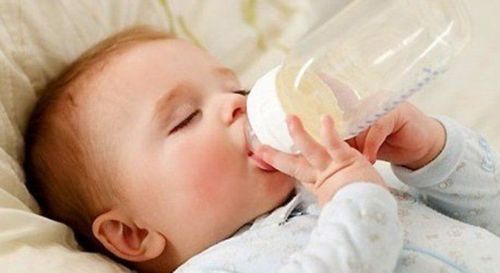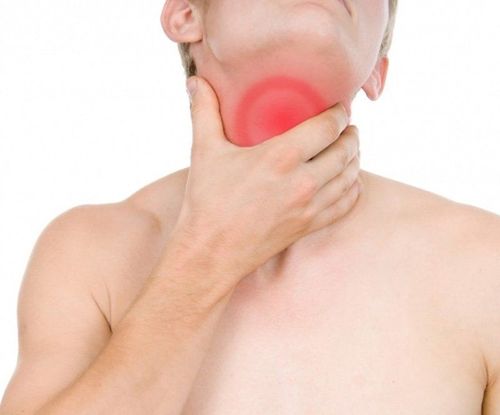This is an automatically translated article.
The article was professionally consulted with Specialist Doctor I Nguyen Thi My Linh - Department of Pediatrics - Neonatology - Vinmec Danang International General Hospital.Hiccups are a common reflex in babies. One of the causes of hiccups in babies is excessive stomach distension. This is a very common condition in babies, even babies can have hiccups while in the womb. The fetus may have hiccups from the second trimester onwards. Your baby may hiccup when swallowing amniotic fluid.
1. Causes of hiccups in children
1.1. Gastroesophageal Reflux Gastroesophageal reflux disease (GERD) is a condition in which food flows backward from the stomach into the esophagus. Reflux occurs when an infant has an underdeveloped lower esophageal sphincter. The lower esophageal sphincter is located between the esophagus and stomach, preventing food from moving back up the esophagus. The reflux of food and stomach acid acts on nerve cells, vibrates the diaphragm and leads to hiccups.1.2. Breastfeeding too full Feeding your baby too full can overstretch the stomach. The sudden expansion of the abdominal cavity causes the diaphragm to constrict, making the baby prone to hiccups.
1.3. Swallowing a lot of air If your baby is bottle-fed, he may swallow too much air because the milk in the bottle flows faster than breast-feeding. Baby swallowing too much air also causes the stomach to enlarge and dilate. Too much bottle feeding can make your baby prone to hiccups and tantrums.
1.4. Allergies Babies can be allergic to proteins in formula or even breast milk, leading to esophagitis. This can cause the baby to hiccups. In addition, breastfed babies can also be allergic to foods eaten by their mothers.
1.5. Asthma If your child has asthma, the bronchial tubes become inflamed, restricting the flow of air to the lungs. This lack of breath causes the baby to wheeze which leads to the diaphragm constricting. As a result, the baby has hiccups.

Trẻ bú quá no cũng dễ khiến bé bị nấc
2. Cure hiccups in babies
Temporary hiccups will go away on their own after a short period of time or may respond well to simple mechanical measures.Sudden fright or startling; Pat or stroke your baby's back, or maybe give her a few sips of sugar water. You can give your baby something to suck on as well as suck on something; Sometimes you can play peek-a-boo with your baby. When your baby has hiccups, distract her with movement games or shake toys in front of her.
3. How to stop hiccups in babies?
To limit and prevent hiccups in children, you should pay attention to the following:You should feed your baby many small meals in a short time rather than stuffing your baby to eat at once. This will limit the risk of your baby having hiccups. Feed your baby in the right position so that the milk flows into the stomach easily. If your baby can sit, let her sit while drinking milk. Doing so will ensure that the food goes straight to the stomach without any air entering. However, do not forget to sit behind to support the baby's back. Listening to music while eating can also cause hiccups. In addition, adjusting the nipple when your baby latches on can also reduce the amount of air entering the stomach. When breastfeeding, make sure your baby's mouth is completely covered with the nipple. Clean the nipples regularly to remove any remaining dry milk residue. If the feeding process is interrupted, the baby will accidentally swallow a lot of air, causing the baby to hiccups. Do not let your baby sleep while bottle-feeding. Unlike breast-feeding, bottle-feeding increases the amount of milk your baby takes in. This is also considered one of the causes of hiccups.

Không được để bé ngủ khi đang bú bình
Children who do not eat properly are at risk of micro-mineral deficiency causing anorexia, growth retardation, malabsorption,... If they notice the above signs, parents should supplement their children with products. The supplement contains lysine, essential micro-minerals and vitamins such as zinc, chromium, selenium, and B vitamins to help fully meet the nutritional needs of children. At the same time, these essential vitamins also support digestion, enhance nutrient absorption, help improve anorexia, and help children eat well.
Parents can learn more:
Signs of zinc deficiency in children
Micronutrient deficiency and failure to gain weight in children
Please regularly visit Vinmec.com website and update useful information to take care of your child. Take care of the baby and the whole family.














